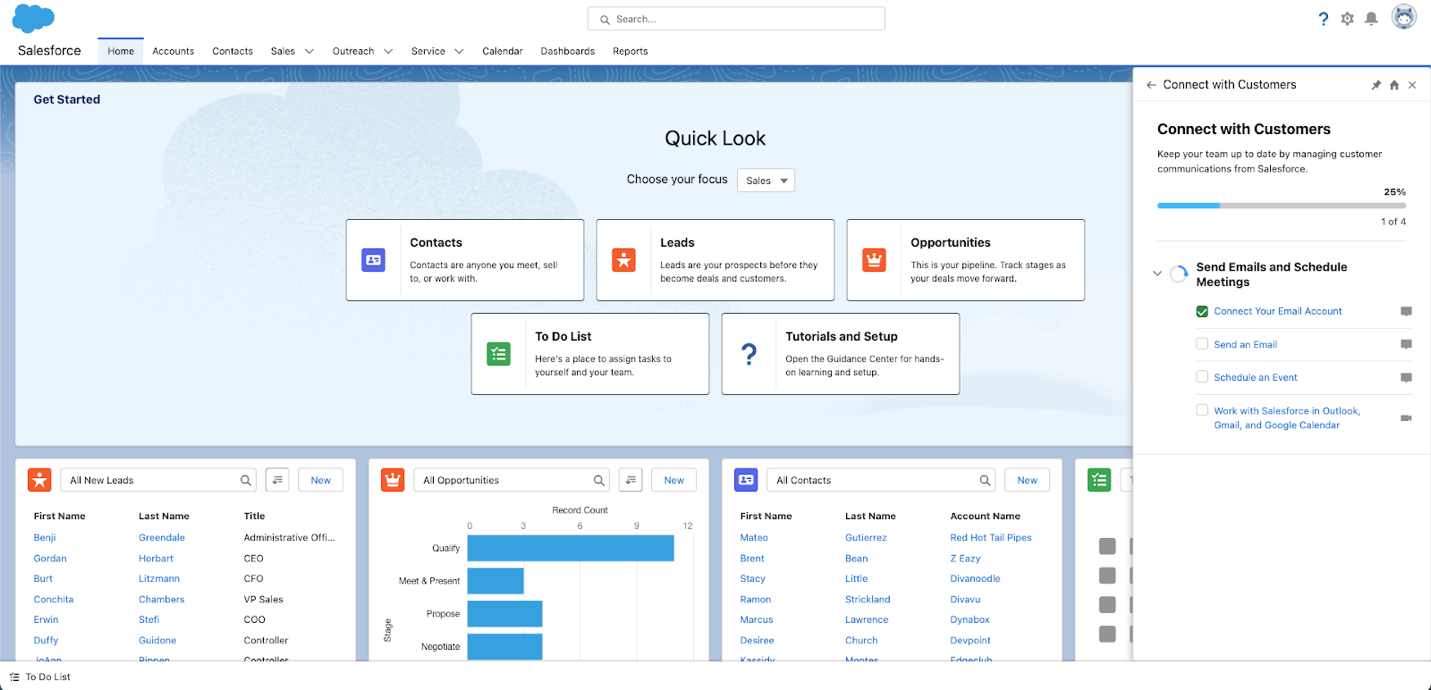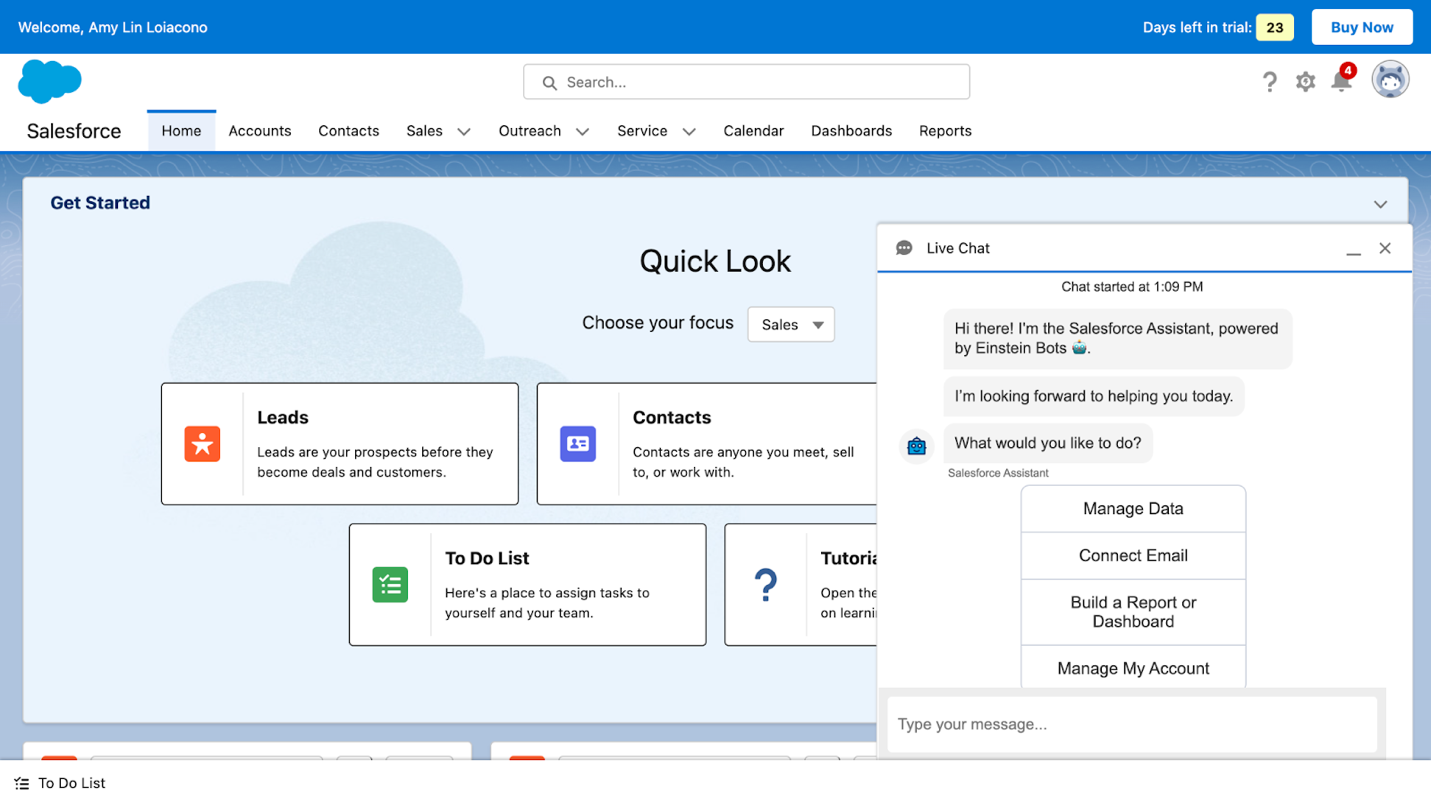Salesforce Starter is Salesforce’s new solution designed to help businesses more easily try, buy, and get value from Salesforce’s CRM solutions. While the first iteration of Salesforce Starter has been available since August 2022, the Summer release, announced on August 2, adds new marketing capabilities to the solution—and makes Starter a much more formidable contender in the entry-level CRM space.
If you’re saying, “Wait a minute, doesn’t Salesforce already have an entry-level CRM solution?” you are both right and wrong. While some of the goals driving Essentials were similar, Salesforce has rethought its strategy and created Salesforce Starter (formerly Salesforce Easy).
Essentials, which Salesforce launched in 2017, has been Salesforce’s entry-level solution. Essentials was designed exclusively for small businesses, and Salesforce capped the number of users at 10. Priced at $25 per user per month, Essentials included sales and service capabilities.
But Essentials lacked all but the most basic marketing functionality because connectors were required to sync data between Salesforce’s Marketing Cloud and its Sales Cloud and Service Cloud, this made it difficult for Salesforce to distill and integrate marketing functionality into Essentials, and to provide a smooth migration experience to other editions of Salesforce.
With Starter, Salesforce has adjusted its course, both in terms of its go-to-market strategy and solution capabilities.
Starter’s Go-to-Market Strategy
On the marketing side, Salesforce has made it easier for users to try, buy and use Starter, with a simplified sign-up process, in-app guidance, and ready-to-use tools embedded directly in the product. Offered via a self-service, ecommerce model, Starter offers a 30-day free trial and a straightforward three-click sign-up process to get started Starter pricing is the same as Essentials, $25 per user per month.
To smooth the onboarding experience, Starter offers a guided onboarding process to help users integrate Starter with their workflows, and in-app chat support to ask questions.
Guidance Center

In-App Chat Support

As the name implies, Salesforce is marketing Starter as an entry point to Salesforce. However, Starter is designed to serve a broader swath of customers than Essentials. Salesforce isn’t limiting the number of users for Starter (as it did for Essentials), giving customers peace of mind that they can stay with the solution as long as it meets their requirements. At the same time, Salesforce has made it easier for customers to migrate to other Salesforce editions as needed by bringing solutions onto the core platform to allow for upgrades across the different clouds. In addition to SMBs, Salesforce is also positioning Starter as a simple way for teams in large organizations to get started with Salesforce.
Starter is live now in the US, India, ANZ, and UK, with plans to expand to other regions with localization in the fall.
In markets where Starter is currently available, Salesforce plans to retire Essentials, though the timeline for that is TBD. Meanwhile, the vendor is funneling Essentials trials and prospects to Starter.
As a result, Starter’s Summer Release now delivers a unified suite of Marketing Cloud, Sales Cloud, and Service Cloud, all powered by Data Cloud.
This is a big advancement, as it means that users can unlock the power of the Data Cloud without having to manage multiple data sources or third-party integrations. Sales, marketing, and service data are automatically integrated into a single, unified customer profile to make it easier for users to provide their customers with a more personalized experience.
With Starter, Salesforce is creating a foundation of data with some Einstein capabilities to create the basis for companies to leverage generative functionality in the future.
Starter Drill Down
The first iteration of Starter offered guided onboarding, as well as solid entry-level functionality for sales and service management, including:
- Account and contact management
- Capabilities to track and manage leads and opportunities
- Email integration, to integrate email with Salesforce Starter
- Einstein Activity Capture to apply AI-driven insights
- Case management
- Knowledge management
- Reports and dashboards
However, it only scratched the surface in terms of marketing. The Summer release, available as of August 3, introduces more robust marketing capabilities to Starter, including:
With Starter, Salesforce is creating a foundation of data with some Einstein capabilities to create the basis for companies to leverage generative functionality in the future.The Summer release, available as of August 3, introduces more robust marketing capabilities to Starter, including:
- Email Builder, which enables users to design personalized emails with a drag-and-drop editor and built-in best practices
- Campaign Templates, which enable users to create, execute, and track marketing campaigns, and to segment customers to personalize campaigns
- Email volume, which includes 2,000 emails per month in the base price. Users can buy additional emails for Starter in increments of 1,000 for $10 per month per organization.
- Campaign Performance, to track, manage and optimize the effectiveness of marketing campaigns
- Marketing Onboarding, to gather customer feedback and streamline the onboarding process for new Starter users to take advantage of new marketing features.
In August 2023, Salesforce also completed development to bring Marketing Cloud onto the core Salesforce platform, eliminating the need for complicated connectors and integration between Sales and Marketing Clouds.
In this version, Salesforce has also added centralized case management and support channels to streamline customer service, and Quick Settings, which enables users to configure and customize Starter settings to their business requirements.
Perspective
In 1999, Salesforce launched as a revolutionary, cloud-based solution designed to “democratize” CRM for small and medium businesses (SMBs). But as cloud technology matured, Salesforce became the major CRM vendor for large enterprises—and its solutions became too complex and expensive for many small and medium businesses.
Meanwhile, as Salesforce acquired and built more “clouds” to expand its capabilities across the CRM spectrum, it became more difficult to distill these into a single, integrated, and easy-to-use solution with broad market appeal.
However, the stars appear to be aligning with Starter. Salesforce has reassessed the nuances of the entry-level CRM market, and done the work to better address their requirements for a more diverse group of entry-level customers.
With the Summer Release, Starter delivers what had been the missing piece of the puzzle—marketing. As important, this underscores that with the platform integration issues that had stymied it in the past now resolved, Salesforce will be able to continue to bring more unified, Customer 360 advantages to Starter as it adds new features and capabilities.
While it’s been a bit of a journey, Salesforce is now fully in the entry-level CRM game. Starter offers businesses a simple and efficient way to leverage the power of Salesforce and reap the benefits of an integrated CRM solution.
© SMB Group, 2023
Note: Salesforce is an SMB Group client
